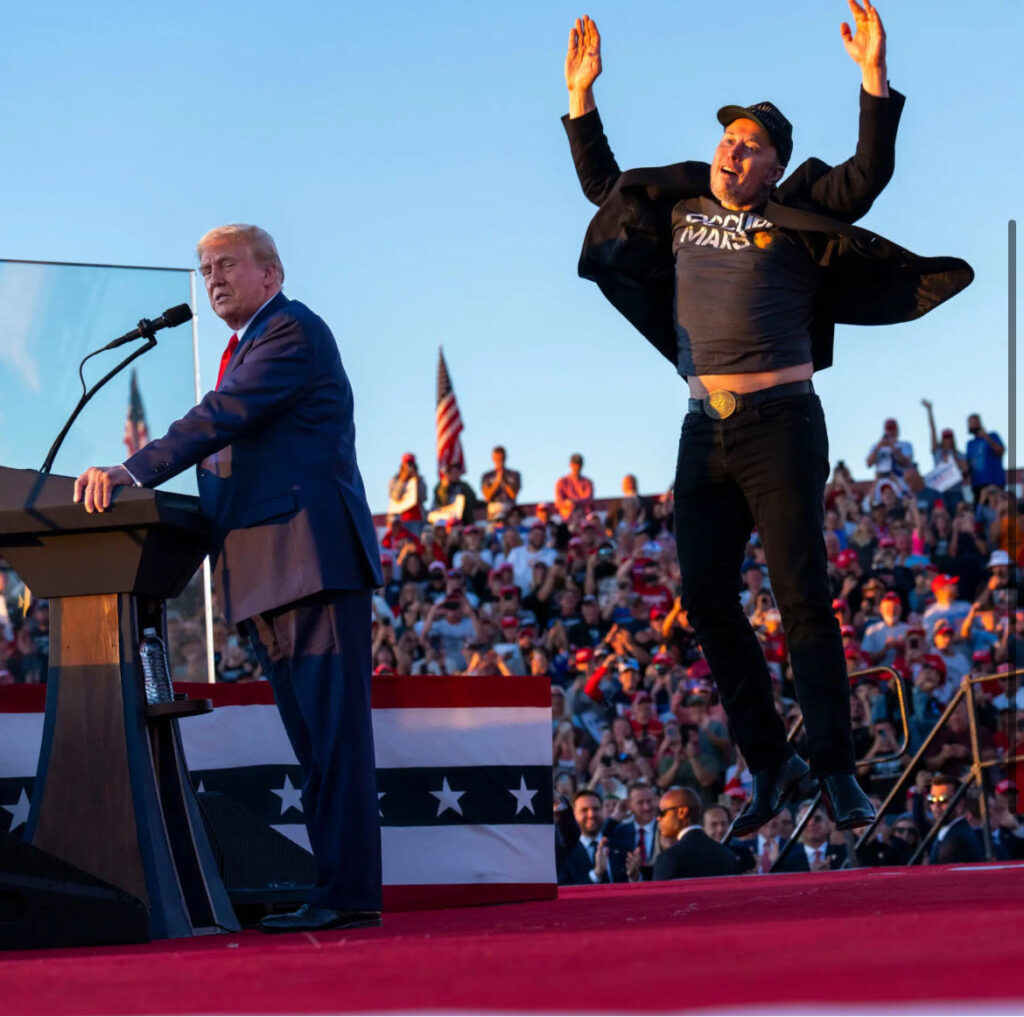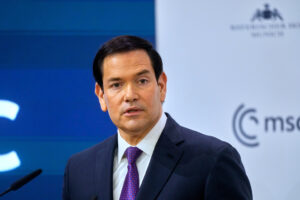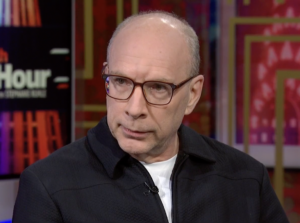Why is Elon Musk supporting Donald Trump? Mars, Tesla, Wealth, and Ego
The alliance between Elon Musk and Donald Trump is driven by a blend of political influence and economic ambition. Their collaboration has the potential to reshape America’s future, disrupting industries and redefining the nation’s political landscape.

Mr. Musk threw his hands in the air at a rally for Donald Trump — and the internet went wild. (Doug Mills/via The New York Times)
Elon Musk’s shift from supporting Democrats to endorsing Republicans, along with his backing of Donald Trump after the failed assassination attempt, has ignited significant curiosity and debate. Many have questioned his motives, with some even speculating that Musk may have lost his grip on reality. In reality, Musk’s shift towards the Republican Party stems primarily from his disagreements with the Democratic Party in a few areas, namely: the fines imposed on SpaceX by the Biden administration, the lack of recognition for Tesla in the U.S. electric vehicle industry, the increased wealth and political influence, and the long-standing political neglect he has faced from the Democrats.
The Democratic administration appeared unsupportive of Musk’s SpaceX project, frequently issuing fines over minor filing issues and introducing procedural hurdles for rocket launches. On the other hand, a shared enthusiasm for space exploration laid the groundwork for collaboration between Musk and Trump. According to Newsweek, Musk believes that overregulation, including launch approvals and restrictions imposed by various federal agencies, is one of the primary obstacles to the SpaceX program. The tensions between Elon Musk and federal regulatory agencies were evident in a series of fines issued before 2024. The Federal Aviation Administration (FAA) imposed multiple penalties on SpaceX for safety violations during that year. For instance, in May 2023, the FAA accused SpaceX of launching the PSN SATRIA satellite before obtaining approval for several required revisions. The agency proposed a fine of $175,000 for each of the two alleged infractions. In 2023, the FAA proposed a total amount of $633,009 in fines to SpaceX. Compared to the resistance Musk faced under the Democratic-led federal government, the space policies released during Trump’s previous presidency aligned much closer with Musk’s vision. In December 2020, Trump issued a National Space Policy including the constructive use of space, promoting the commercial space industry, and preparing for returning to the Moon and exploring Mars. Trump’s proposal to establish the U.S. space force was also exactly to Musk’s liking. The realm of space exploration served as the cornerstone for forging collaboration between Musk and Trump.
Moreover, Trump did not overlook Tesla’s significance in the U.S. electric vehicle industry, even though supporting Tesla could conflict with supporting labor unions. Aside from SpaceX, Musk is also known for his role as CEO of Tesla, an American multinational automotive and clean energy company. Rather than partnering with Tesla and the electric vehicle industry, Democrats focused more on the traditional automotive industry and unions. According to The Wall Street Journal, President Biden “has always seen unions as a bedrock of support”. He calls himself the most pro-union president in history, with a record ranging from shoring up pension plans to prioritizing union labor in his infrastructure and clean-energy law. In other words, the Democrats’ strategy was to concentrate on securing union votes. In contrast, Tesla stands as the only major American automaker without union representation. Musk is absolutely not a fan of the union system. Given these circumstances, the strained collaboration between the Democrats and Tesla, and therefore Musk, seemed inevitable. On the contrary, Trump did not alienate Musk in pursuit of union votes. Instead, he chose a different approach: assuring American workers that they would have jobs. By doing so, Trump managed to attract union workers’ votes without significantly damaging his relationship with Musk. This has resulted in a milder conflict between Trump and Musk concerning the union issue, which did not hinder their collaboration during his 2025 presidential campaign.
Elon Musk is willing to collaborate with Donald Trump because it allows him to retain a significant stake in his company while gaining substantial political power, giving him a great degree of influence in U.S. politics. Additionally, his wealth continues to grow. Now, Elon Musk has been appointed as a special employee of the federal government. According to The New York Times, the definition of a special employee is an executive branch appointee named to “perform important, but limited, services to the government, with or without compensation, for a period not to exceed 130 days” during a one-year period. Although the law prohibits such government employees from participating personally and substantially in official matters where they have a financial interest, this designition allows Musk the ability to implement significant reforms at the state level without being required to sell all his company shares. From another perspective, many believed Musk becoming a federal official would never materialize given his drug use history and his connections with foreign leaders. However, thanks to Trump’s strategic maneuvers, Musk has successfully involved himself in the political workings of the White House to the fullest extent possible. Furthermore, since Trump’s election on November 5th, Musk’s net worth surged by 84%, rising from $264 billion to $486 billion. While it slightly declined afterward, his wealth still skyrocketed as a result of the election. At least for now, Musk finds himself in a position where both his political and economic interests are thriving, which is a major reason why he supports and has joined Trump’s camp.
As a man with unshakable confidence, did the indifference from Democrats harm Musk’s ego? In my opinion, the answer is a resounding yes. In August 2021, former President Biden hosted an event to promote electric vehicles, centered around his executive order which set a target for half of all new vehicles sold by 2030 to be zero-emission. Shortly before the event, White House officials reached out to Tesla with an apology: Elon Musk had not been invited. As one of the most influential EV manufacturers and a long-time supporter of the Democrats, this lack of an invitation was akin to a slap in the face for Musk. This event was not an isolated incident. In November 2021, Biden told the CEO of General Motors that GM electrified the entire automobile industry and led everything in that field. This statement outraged Tesla’s leaders because, during the fourth quarter of 2021, Tesla delivered more than 115,000 EVs in the U.S. while GM produced only 26 EVs. Since then, Musk has steadily opposed the Democrat’s policies. Musk’s bruised ego is understandable, as he felt the Democrats failed to recognize his contributions adequately. Musk’s strong support for Trump and his break from the Democrats can be partly attributed to the party’s lack of recognition of him.
Elon Musk’s shift from supporting Democrats to endorsing Trump is driven by his dissatisfaction with the Democrats, and his desire for political influence and more wealth. Trump’s rise to power and his collaboration with Musk has made the future of American society increasingly unpredictable. With Musk being granted such a powerful role in DOGE by the Trump administration, it is no longer just the Democrats who are at Musk’s whim. As the Musk-Trump partnership deepens, all Americans will face the growing uncertainty brought by this alliance. In the midst of this political turbulence, each individual must decide what kind of future they want for themselves and their country.
Editors
Carolina Xavier, Administrative Editor-In-Chief
Makenzie Rodrigues, Copy-Editor

Elsie Jia was one of the Senior Managing Editors at the Journal of Political Inquiry (JPI) in Fall 2024 and is Master’s student in International Relations at NYU, specializing in U.S. foreign policy and East Asian studies. Originally from China, she has served as editor-in-chief of the CUHKSZ student magazine and worked as an editor at a major publishing house. Elsie is passionate about international politics and committed to deepening understanding of global issues.




